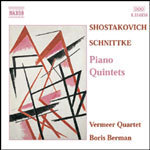
Shostakovich/Schnittke: Piano Quintets
 $25.00
Low Stock
add to cart
$25.00
Low Stock
add to cart
DMITRI SHOSTAKOVICH / ALFRED SCHNITTKE
Shostakovich/Schnittke: Piano Quintets
Boris Berman (piano) / Vermeer Quartet.
[ Naxos / CD ]
Release Date: Tuesday 14 January 2003
Should this item be out of stock at the time of your order, we would expect to be able to supply it to you within 2 - 5 business days.
"Boris Berman and the Vermeer Quartet prove to be extremely sensitive to the emotional demands of each work, giving highly accomplished and committed performances in adequate, if somewhat studio-bound sound."
- Erik Levi, BBC Music Magazine, January 2003
"This is a dedicated performance recorded for Canadian radio, that with extreme dynamics contrasts brings out the greatness of the piece. The Schnittke Piano Quintet is similarly one of the composer's finest chamber works, darkly elegiac, written in memory of his mother. Its gloom inspires Berman and the Vermeer Quartet to a powerfully concentrated performance."
- Edward Greenfield, The Guardian, December 6, 2002
"Boris Berman and the Vermeer Quartet prove to be extremely sensitive to the emotional demands of each work, giving highly accomplished and committed performances in adequate, if somewhat studio-bound sound."
- Erik Levi, BBC Music Magazine, January 2003
"These are magnificent performances. The sense of balance and ensemble here is near perfect. Particularly pleasing is the ability of these musicians to recognize when their individual lines are important and when in turn to get out of the way of a colleague...This is music-making of the first order, and repertoire worthy of inclusion in the canon of masterworks of the genre.
This is a disc that all lovers of great chamber music should own. Once again Naxos proves that quality and high price are not synonymous. Recorded sound it superb. Recommended without reservation."
- Kevin Sutton, musicweb.uk.net
As the leading Soviet composers of the mid- and late twentieth century, Dmitry Shostakovich (1906- 1975) and Alfred Schnittke (1934-1998) shared certain characteristics: musically, a frequent recourse to symphonic writing, with fifteen and nine symphonies respectively; socially, having to endure constant pressure from the authorities, whether the ruthless directives of Stalin, or the repressive conformism of Brezhnev. While Schnittke never studied with the older composer, his assuming of Shostakovich's mantle was something he himself was aware of, and nowhere is the connection between the two more apparent than in the piano quintets, written at relative turning-points in their careers. For Shostakovich, this meant the consolidation of a more classical approach to large-scale form in the wake of his Fifth Symphony, for Schnittke, the arrival at a pluralist approach to composition, with the old and the new held in free and often provocative association.
Shostakovich began his Piano Quintet during the summer of 1940, completing it on 14th September. Written with himself and the Beethoven Quartet in mind, the work was first performed by them in Moscow on 23rd November. After the mixed reception accorded his Sixth Symphony the previous December, the success of the Piano Quintet was widespread and lasting. On 16th March 1941 it was awarded the Stalin Prize, and was for many years regarded more highly in the West than any of the symphonies. Shostakovich continued to perform the work until illness curtailed his concert appearances at the end of the 1950s. The five-movement form was subsequently pursued in the Eighth Symphony and Third String Quartet of 1943 and 1946 respectively.
The Prelude opens with a deliberate chord of G minor, the piano's declamatory theme provoking an impassioned response from the strings. The piano leads off with a flowing melody over a stepwise accompaniment, with a sequence of counter-melodies on solo strings. At length, the initial tempo and expression are restored, a modified version of the initial theme invites intensive dialogue, with which the movement ends. A brief pause, and the Fugue opens with the theme on first violin. The remaining strings enter in stages, building up an elegiac web of sound, to which the piano adds a bass line. This continues unaccompanied, the strings re-entering as the dialogue intensifies, culminating in a modified recall of the work's initial gesture. The music quietens, and the elegiac mood from the outset resumes, moving inevitably into a resigned coda. The Scherzo is launched over a chugging accompaniment, the piano conjuring up a witty theme which interacts teasingly with the strings. The first trio section has a flighty, gypsy-like air; the second involves playful pizzicato. The main theme concludes the movement in boisterous humour. The Intermezzo opens with a plaintive violin melody over a 'walking bass' accompaniment on cello, the remaining strings entering in bitter-sweet counterpoint. The piano continues this mood, underpinning an intensifying string commentary, and reaching a brief but heartfelt apex, before falling back into the wistful mood with which it began. Without pause, the Finale begins with a ruminative theme on the piano, taken on by the strings as the discourse picks up. Over an animated accompaniment, the piano introduces a livelier theme, the strings responding in robust accord. The mood quietens, and a reminder of the work's impassioned beginning intercedes suddenly on strings. Yet this cannot undermine the movement's composure, and, with a brief recall of the second theme, the work proceeds to a quiet and contented close.
Tracks:
DMITRY SHOSTAKOVICH
Quintet for Piano and Strings
01. Prelude 04:21
02. Fugue 09:14
03. Scherzo 03:22
04. Intermezzo 06:48
05. Finale 07:16
ALFRED SCHNITTKE
Quintet for Piano and Strings
06. Moderato 05:41
07. In Tempo di Valse 05:05
08. Andante 05:55
09. Lento 04:35
10. Moderato pastorale 04:08

